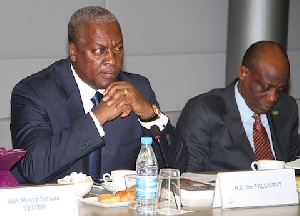Ghana, formerly the darling of West Africa and one of the fast growing economies in the world, is in the midst of a major economic crunch. From a stellar 13.6% growth rate in 2011 driven by bumper cocoa, gold and oil revenues, the country’s economy has deteriorated significantly to the point it now requires external assistance to remedy its problems.
As things stand, the twin deficits, rising inflation, rapidly depreciating currency, multi-year low growth rate and low levels of foreign exchange reserves present major threats to the economy.
Whilst these issues can largely be traced to the “political business cycle” around elections, and particularly excesses in relation to the single spine salary wage increases, (the wage bill rose from GH¢2.5bn to GH¢8bn in 2012; which represents 60.9% of government revenues), the current situation has badly dented investor confidence in the economy. Major policy decisions will now need to be taken to arrest the economic decline.
Ballooning government debt and falling export revenue triggered a 31% plunge in the currency against the dollar in 2014 which left the government with no option but to turn to the International Monetary Fund (IMF) for financial and technical assistance in August last year.
After months of negotiations, in February, Ghana agreed with the International IMF to execute a three-year programme worth $940m to support the West African country. In April, the agreement will go before the IMF board for final approval to pave the way for its implementation.
The IMF loan terms will require the government to cut back on spending, especially on civil servants’ salaries, which account for more than 60% of tax revenue.
"The main priority of the programme is to restore debt sustainability through sustained fiscal consolidation, and to support growth with adequate capital spending and a reduction in financing costs," according to IMF African Department division chief Joel Toujas-Bernaté.
The programme aims at: restraining and prioritising public expenditure with a transparent budget process; increasing tax collection; and strengthening the effectiveness of the central bank’s monetary policy.
Indeed, a lack of fiscal discipline is at the heart of the country’s problem. Ghana’s macroeconomic governance and structural reforms have been known to suffer from political budget cycles; the 1996, 2000 and 2008 elections were noted for high, unplanned expenditures by governing parties to renew their mandate, which put fiscal consolidation at risk. This has led to the expectation of an election cycle impact on the economy, requiring an adjustment in the years which follow in order to maintain macroeconomic stability.
The adjustment since 2012, however, has been ineffective. Despite taking some politically difficult decisions such as partially removing fuel subsidies, raising the prices of utilities, introducing new taxes and issuing a freeze on public sector wages and the financing of new projects, these measures have not had the desired effect and the economy continues to suffer from severe vulnerabilities. The government again missed its 2013 fiscal target of 9% with the deficit clocking in at 10.8%. The 2014 deficit did not fare much better at an elevated 9.6%.
Following the closely contested elections in 2012, the usual themes of a fiscal hangover, currency weakness and rampant inflation again manifested themselves. However, the magnitude of the fiscal blowout surprised even the most conservative of analysts.
The country ran a massive deficit of 12.1.% in 2012, versus the targeted 6.7%, with recurrent expenditure for 2012 coming in at 22.3% above budget. Ghana has essentially fallen into a debt trap as interest rates continue to surpass GDP growth rates, suggesting that interest payments will probably be financed through additions to public debt or at the expense of other key government operations. The risks that arise from poor fiscal management are grave and threaten to puncture Ghana’s bright economic prospects over the medium term if left unaddressed.
With a limited and ineffective response on the fiscal side of the equation, authorities relied on monetary policy to do the heavy lifting, but this too proved unsuccessful. Emergency measures including new foreign exchange laws and a 200 basis point interest rate hike in early February 2014, were followed by an increase in the cash reserve requirement for banks to 11% from 9% in early April last year.
The central bank again hiked its benchmark policy rate to 21% in October, citing continued stress on its fiscal position, especially falling revenues and rising debt servicing costs. Yet after an initial reprieve in the last quarter of 2014, following the prospect of an IMF deal, the cedi has continued to tumble, indicative of weak confidence in the currency both domestically and abroad.
There is also doubt as to how much more “belt tightening” the Ghanaian consumer will be able to stomach. Already, the consumer has borne the brunt of the interest rate hikes, currency depreciation, double digit inflation, petrol price hikes, as well as Vat and power price increases. Thus far there has been limited (albeit growing) industrial action; however, President Mahama will find it increasingly difficult to contain expenditure, amidst a deflationary environment and increasing frustration with the economy.
Furthermore, the country is now in its third year of power outages, known in Ghanaian parlance as “dumsor” - which literally translated means “switch off and on”. The unstable supply of fuel from Nigeria, inadequate water levels at Ghana’s three hydropower facilities and the frequent breakdown of equipment at power plants have resulted in demand outstripping supply. Although the government has promised to work hard to restore the power supply in the country, this year load shedding or “dumsor” has intensified with 12 hours of power followed by 24 hour of lights out which has put strain on both businesses and the man on the street.
The immediate challenge for Mahama’s government is to reduce the “credibility gap” the current National Democratic Congress administration faces, particularly in terms of its ability to effectively manage the economy. In the two years during which the Mahama administration has been in power, it has missed all of its major economic targets. As a result, questions remain around its ability to effectively execute the programme, particularly with the 2016 elections approaching.
Though government campaigning periods are renowned for overspending and increases in wages, a dip in commodity prices since 2011 highs, means the country will find it extremely difficult to muddle through along the current path. It will be a true test for authorities to keep a tight rein on spending towards December 2016. Implementation, therefore, remains a key risk.
A return to stability largely depends on whether the government can take the necessary fiscal pain upfront and implement the IMF’s strict requirements to shore up market confidence and revive portfolio investment. A failure to do so will trigger waves of capital flight, accelerating the pace of cedi depreciation as local and foreign investors trim their exposure to Ghanaian assets. Conversely, the successful implementation would improve fiscal discipline, help to restore macroeconomic stability and support the currency.
In this regard, the recent move has been welcomed by investors, who view the IMF’s assistance as a nominal policy anchor. The yield on Ghana’s 2026 Eurobond issued compressed by 12 basis points on the back of the announcement.
Whilst the agreement with the IMF is a positive step, austerity measures will start in earnest in 2015 and are set to continue for the next three years. However, it is not a “silver bullet” and short-term pressures will remain elevated in the Ghanaian economy. Any solution requires some strong medicine, and currently, questions remain around the political will of the economic policy makers.
Fiscal consolidation efforts, clear monetary policy guidance, and implementation of the IMF will be key factors to watch over the coming months and years as Ghanaian authorities attempt to put their economy back on a sound footing.
Business News of Tuesday, 3 March 2015
Source: cnbcafrica.com













